一般过去时句型转换
一般过去时的用法及结构

一般过去时的用法及结构1.一般过去时的基本用法一般过去时表示过去某个时间发生的动作或存在的状态,也可表示过去经常或反复发生的动作。
常和表示过去的时间状语连用,如yesterday, last week, last night, in 2003, two days ago 等。
【举例】 I got up at 6:30 yesterday. 我昨天6:30起床。
My father was very busy last week. 我父亲上周很忙。
2.一般过去时的基本结构⑴肯定句“主语+动词过去式+其他”或者“主语+was/were+其他”。
【举例】 I played tennis last weekend. 我上周末打网球了。
My school trip was great. 我的学校郊游棒极了。
⑵否定句“主语+didn’t+动词原形+其他”或“主语+wasn’t/weren’t+其他”。
【举例】 The girl didn’t play computer games yesterday afternoon.这个女孩昨天下午没玩电子游戏。
Old Henry wasn’t happy last Friday. 上星期五老亨利不高兴。
⑶一般疑问句“Did+主语+动词原形+其他?”肯定回答为“Yes,主语+did”,否定回答为“No,主语+didn’t”或者“Was/Were+主语+其他?”肯定回答为“Yes,主语+was/were”,否定回答为“No,主语+wasn’t/weren’t”。
【举例】— Did you go to the beach? 你们去海滩了吗?— Yes, we did./No, we didn’t. 是的,我们去了。
/不,我们没有。
— Was your weekend OK? 你的周末过得还行吧?— Yes, it was./No, it wasn’t. 是的,还行。
/不,不行。
一般过去时的用法

一般过去时的用法一般过去时表示过去某个时间发生的动作或存在的状态。
常和表示过去的时间状语连用。
如:last year, yesterday等;也可表示过去经常反复发生的动作,常和often, always等频率副词连用。
例如:I saw him in the street yesterday. 昨天我在街上看见他了。
Li Mei always went to school on foot last year. 去年李梅总是步行上学。
注意:也可以用“used to +动词原形”表示过去经常或反复的动作。
eg. We used to get up early. 我以前总是早起。
(意指现在不早起了)1.一般过去时的形式:动词be: 第一人称单数和第三人称单数用was, 其余的人称一律用were。
动词have: 一律用had, 没有人称和数的变化。
行为动词:一律用过去式,没有人称和数的变化,行为动词的过去式有两类,一类是规则动词,另一类是不规则动词。
一般过去时动词的肯定、否定、一般疑问句和简略回答以及特殊疑问句的形式见列表:肯定、否定形式行为动词的过去时的否定式,要使用助动词do 的过去式did,后面的谓语动词要还原为原形。
注意:在非正式语如口语中,was not, were not, had not和did not 可以分别缩写成wasn’t, weren’t, hadn’t和didn’t。
2.一般过去时的几种句型(这里只讲行为动词)肯定句结构为:主语+动词的过去式+其他。
如:He went to the toy store yesterday. 他昨天去玩具店了。
否定句结构为:主语+did not (didn’t)+动词原形+其他。
如:He didn’t go to the toy store yesterday. 他昨天没去玩具店。
一般疑问句的构成:Did+主语+动词原形+其他?如:1) -Did you go to Beijing last week?-Yes, we did. (No, we didn't.)2) -Did you meet the businessman before?-No, I didn't. (Yes, I did.)特殊疑问句的构成:疑问词+did+主语+动词原形+其他?如:1) -What did you do last night?-I did my homework.2) -Where did you go last week?-I went to Shanghai with my parents.Ⅱ. 行为动词的一般过去式变化规则行为动词的过去式有规则变化和不规则变化两种。
一般过去时的用法和结构
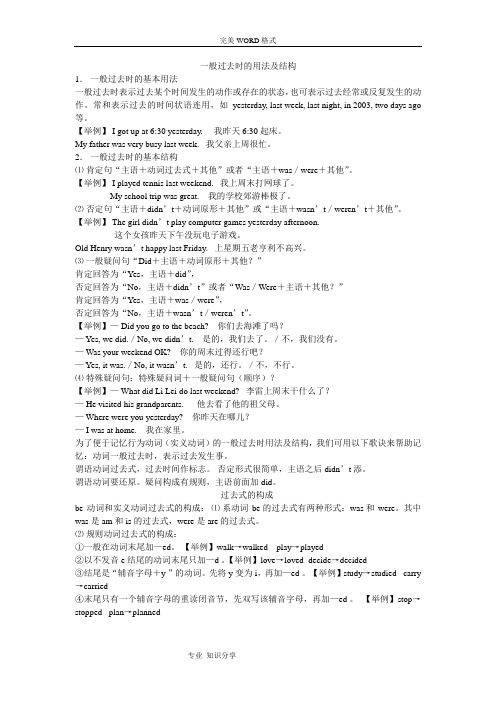
一般过去时的用法及结构1.一般过去时的基本用法一般过去时表示过去某个时间发生的动作或存在的状态,也可表示过去经常或反复发生的动作。
常和表示过去的时间状语连用,如yesterday, last week, last night, in 2003, two days ago 等。
【举例】 I got up at 6:30 yesterday. 我昨天6:30起床。
My father was very busy last week. 我父亲上周很忙。
2.一般过去时的基本结构⑴肯定句“主语+动词过去式+其他”或者“主语+was/were+其他”。
【举例】 I played tennis last weekend. 我上周末打网球了。
My school trip was great. 我的学校郊游棒极了。
⑵否定句“主语+didn’t+动词原形+其他”或“主语+wasn’t/weren’t+其他”。
【举例】 The girl didn’t play computer games yesterday afternoon.这个女孩昨天下午没玩电子游戏。
Old Henry wasn’t happy last Friday. 上星期五老亨利不高兴。
⑶一般疑问句“Did+主语+动词原形+其他?”肯定回答为“Yes,主语+did”,否定回答为“No,主语+didn’t”或者“Was/Were+主语+其他?”肯定回答为“Yes,主语+was/were”,否定回答为“No,主语+wasn’t/weren’t”。
【举例】— Did you go to the beach? 你们去海滩了吗?— Yes, we did./No, we didn’t. 是的,我们去了。
/不,我们没有。
— Was your weekend OK? 你的周末过得还行吧?— Yes, it was./No, it wasn’t. 是的,还行。
/不,不行。
(完整版)一般过去时句型转换
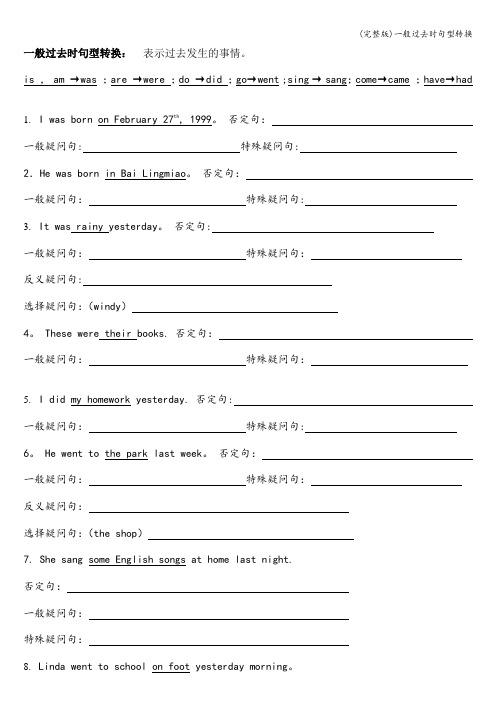
一般过去时句型转换:表示过去发生的事情。
is , am →was ;are →were ;do →did ;go→went ;sing → sang;come→came;have→had1.I was born on February 27th, 1999。
否定句:一般疑问句: 特殊疑问句:2.He was born in Bai Lingmiao。
否定句:一般疑问句:特殊疑问句:3.It was rainy yesterday。
否定句:一般疑问句:特殊疑问句:反义疑问句:选择疑问句:(windy)4。
These were their books. 否定句:一般疑问句:特殊疑问句:5.I did my homework yesterday. 否定句: 一般疑问句:特殊疑问句:6。
He went to the park last week。
否定句:一般疑问句:特殊疑问句:反义疑问句:选择疑问句:(the shop)7. She sang some English songs at home last night.否定句:一般疑问句:特殊疑问句:8.Linda went to school on foot yesterday morning。
否定句:一般疑问句:特殊疑问句:反义疑问句:选择疑问句:(by bike)9.They lived in a big house 10 years ago. 否定句: 一般疑问句:特殊疑问句:10.The twins liked swimming last year. 否定句: 一般疑问句:特殊疑问句:反义疑问句:选择疑问句:(running)11.There used to be lots of flowers in the garden years ago.否定句:一般疑问句:特殊疑问句:。
时态三、一般过去时
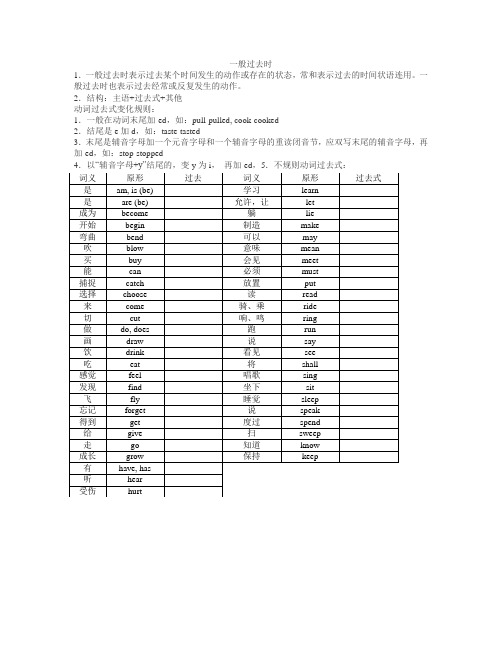
一般过去时1.一般过去时表示过去某个时间发生的动作或存在的状态,常和表示过去的时间状语连用。
一般过去时也表示过去经常或反复发生的动作。
2.结构:主语+过去式+其他动词过去式变化规则:1.一般在动词末尾加-ed,如:pull-pulled, cook-cooked2.结尾是e加d,如:taste-tasted3.末尾是辅音字母加一个元音字母和一个辅音字母的重读闭音节,应双写末尾的辅音字母,再加-ed,如:stop-stopped4.以“辅音字母+y”结尾的,变y为i,再加-ed,5.不规则动词过去式:三、句型转换:一般过去式看动词,动词必须用过去式,变一般疑问句先找be 和情态动词,若有提前并大写,若无借助于did,实义动词要还原。
变否定句先找be 和情态动词,若有再后加not,若无借助于didn’t,实义动词要还原。
特殊疑问句由疑问词+一般疑问句构成。
四、标志词:1. yesterday、last+时间、时间+ago、just now、in+过去的时间一、单项选择:从下列各题后所给的四个选项中选择最佳答案填空。
(10)( )1.My father______ill yesterday.A.isn't B.aren't C.wasn't D.weren't( )2.______your parents at home last week﹖A.Is B.Was C.Are D.Were( )3.The twins______in Dalian last year.They______here now.A.are; were B.were; are C.was; are D.were; was ( )4.______your father at work the day_____yesterday(前天)﹖A.Was; before B.Is; before C.Was; after D.Is; after ( )5.—Who was on duty last Friday﹖—______.A.I am B.I was C.Y es, I was D.No, I wasn't ( )6. I cleaned my classroom ___________.A with three hoursB three hours agoC in three hoursD three hours before( ) 7. I came _______ my house two days ago .A back onB back toC to backD back( ) 8 . ___________? He did some reading at home.A What does your father do yesterday eveningB What does your brother do in the schoolC What did your brother do over the weekendD Where did your brother go last Sunday( ) 9. What did you do ________ ? I went to the movies.A next morning Bover the weekend C in the weekend D next Monday( ) 10. The koala sleeps _______,but gets up _________.A during the day; at the eveningB at day ;during nightC in the day ;during the eveningD during the day ; at night二、请用正确动词形式填空。
超详细一般过去时的全面讲解【附练习与答案】
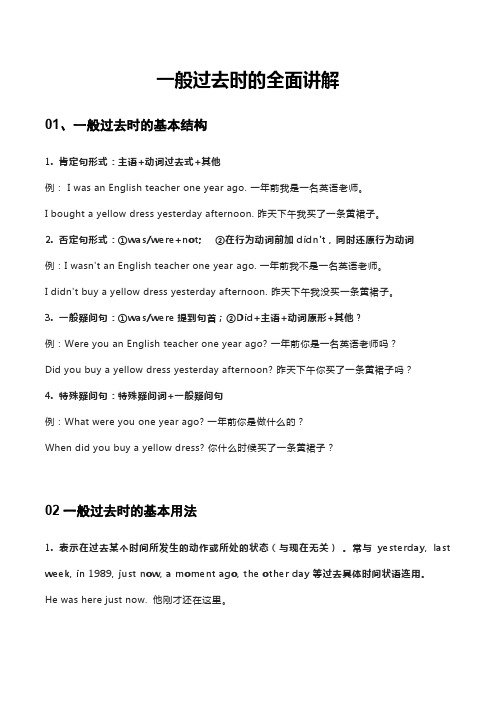
一般过去时的全面讲解01、一般过去时的基本结构1. 肯定句形式:主语+动词过去式+其他例: I was an English teacher one year ago. 一年前我是一名英语老师。
I bought a yellow dress yesterday afternoon. 昨天下午我买了一条黄裙子。
2. 否定句形式:①was/were+not; ②在行为动词前加didn't,同时还原行为动词例:I wasn't an English teacher one year ago. 一年前我不是一名英语老师。
I didn't buy a yellow dress yesterday afternoon. 昨天下午我没买一条黄裙子。
3. 一般疑问句:①was/were提到句首;②Did+主语+动词原形+其他?例:Were you an English teacher one year ago? 一年前你是一名英语老师吗?Did you buy a yellow dress yesterday afternoon? 昨天下午你买了一条黄裙子吗?4. 特殊疑问句:特殊疑问词+一般疑问句例:What were you one year ago? 一年前你是做什么的?When did you buy a yellow dress? 你什么时候买了一条黄裙子?02一般过去时的基本用法1. 表示在过去某个时间所发生的动作或所处的状态(与现在无关)。
常与yesterday, last week, in 1989, just now, a moment ago, the other day等过去具体时间状语连用。
He was here just now. 他刚才还在这里。
What did you do yesterday? 你昨天做了什么事?2. 在过去一段时间内的经常性或习惯性动作。
【单元热点难点】译林版(三起)英语六年级上册Unit 3 Holiday fun 语法重点(含解析)
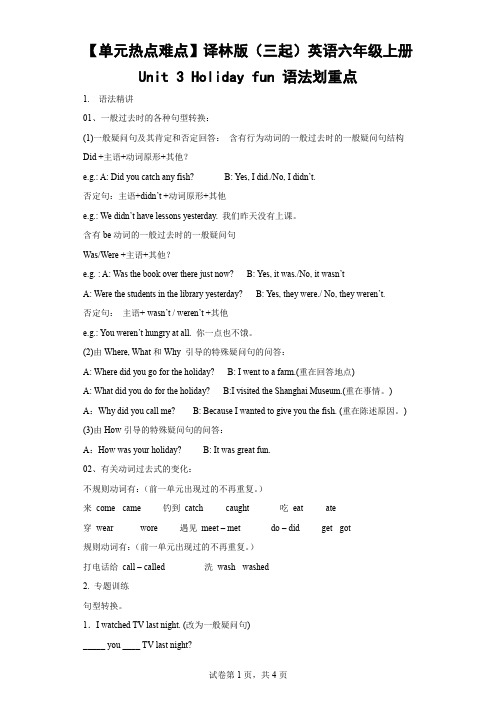
【单元热点难点】译林版(三起)英语六年级上册Unit 3 Holiday fun 语法划重点1. 语法精讲01、一般过去时的各种句型转换:(1)一般疑问句及其肯定和否定回答:含有行为动词的一般过去时的一般疑问句结构Did +主语+动词原形+其他?e.g.: A: Did you catch any fish? B: Yes, I did./No, I didn’t.否定句:主语+didn’t +动词原形+其他e.g.: We didn’t have lessons yesterday. 我们昨天没有上课。
含有be动词的一般过去时的一般疑问句Was/Were +主语+其他?e.g. : A: Was the book over there just now? B: Yes, it was./No, it wasn’tA: Were the students in the library yesterday? B: Yes, they were./ No, they weren’t.否定句:主语+ wasn’t / weren’t +其他e.g.: You weren’t hungry at all. 你一点也不饿。
(2)由Where, What和Why 引导的特殊疑问句的问答:A: Where did you go for the holiday? B: I went to a farm.(重在回答地点)A: What did you do for the holiday? B:I visited the Shanghai Museum.(重在事情。
)A:Why did you call me? B: Because I wanted to give you the fish. (重在陈述原因。
)(3)由How引导的特殊疑问句的问答:A:How was your holiday? B: It was great fun.02、有关动词过去式的变化:不规则动词有:(前一单元出现过的不再重复。
一般过去时

(5) 表示在此之前一段时间内经常或反复的动作。 常与always,never等连用。 Mrs. Peter always carried an umbrella. 彼得太太过去老是带着一把伞。 (只是说明她过去的动作,不表明她是否常带着伞。) 比较 Mrs. Peter always carries an umbrella. 彼得太太老是带着伞。 (说明这是她的习惯,表明她仍然还习惯总带着一把伞) Mrs. Peter is always carrying an umbrella. 彼得太太 总是带着一把伞。 (表示说话者对这一动作或行为厌烦) I never drank wine.我以前从不喝酒。 (不涉及到说明是否喝酒)
翻译下列句子: 1.我上周去看爷爷和奶奶了。 2.你的弟弟踢足球了吗?不,他没踢足球。
3.你读这本书了吗?
4.妈妈昨晚没看电视,她去阿姨家了。
5.我们昨天没去公园,去了动物园。
1. I visited my grandfather and grandmother last week. 2.did your brother play the football?/no,he did not. 3.did you read this book? 4.mother did not watch the TV,she went to my aunt's house. 5.we did not go to the park yesterday,we went to the zoo..
举例说明: He was here only a few minutes ago. (仅仅几分钟前他还在这里。) I came home just now. (我刚回到家。)
I got up very early this morning. (今天早晨我起床很早。) He was late for school again today. (今天他又迟到了。)
小升初语法专项-一般过去时(通用版,含答案)
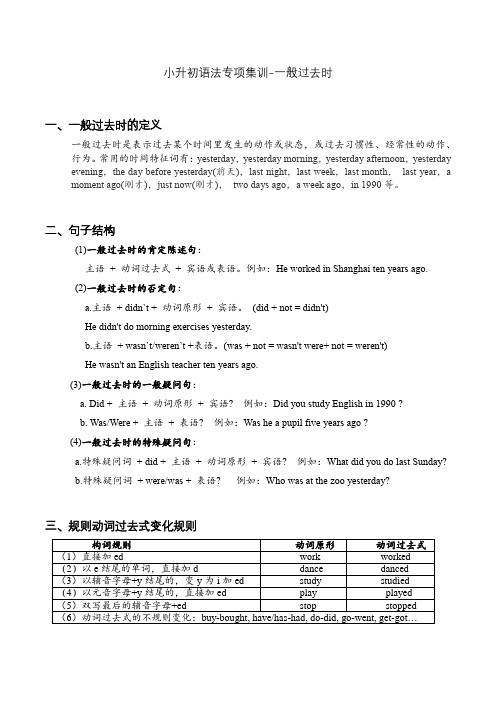
小升初语法专项集训-一般过去时一、一般过去时的定义一般过去时是表示过去某个时间里发生的动作或状态,或过去习惯性、经常性的动作、行为。
常用的时间特征词有:yesterday,yesterday morning,yesterday afternoon,yesterday evening,the day before yesterday(前天),last night,last week,last month,last year,a moment ago(刚才),just now(刚才),two days ago,a week ago,in 1990等。
二、句子结构(1)一般过去时的肯定陈述句:主语+ 动词过去式+ 宾语或表语。
例如:He worked in Shanghai ten years ago.(2)一般过去时的否定句:a.主语+ didn`t + 动词原形+ 宾语。
(did + not = didn't)He didn't do morning exercises yesterday.b.主语+ wasn`t/weren`t +表语。
(was + not = wasn't were+ not = weren't)He wasn't an English teacher ten years ago.(3)一般过去时的一般疑问句:a. Did + 主语+ 动词原形+ 宾语? 例如:Did you study English in 1990 ?b. Was/Were + 主语+ 表语? 例如:Was he a pupil five years ago ?(4)一般过去时的特殊疑问句:a.特殊疑问词+ did + 主语+ 动词原形+ 宾语? 例如:What did you do last Sunday?b.特殊疑问词+ were/was + 表语? 例如:Who was at the zoo yesterday?三、规则动词过去式变化规则一、写出下列单词的过去式。
一般过去时
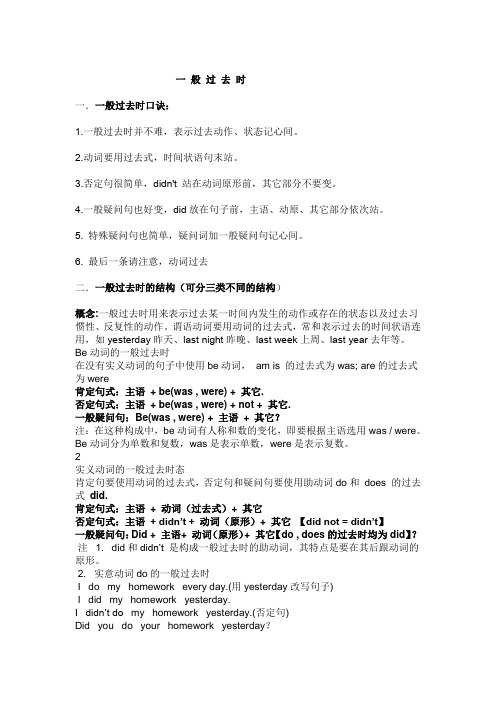
一般过去时一.一般过去时口诀:1.一般过去时并不难,表示过去动作、状态记心间。
2.动词要用过去式,时间状语句末站。
3.否定句很简单,didn't 站在动词原形前,其它部分不要变。
4.一般疑问句也好变,did放在句子前,主语、动原、其它部分依次站。
5. 特殊疑问句也简单,疑问词加一般疑问句记心间。
6. 最后一条请注意,动词过去二.一般过去时的结构(可分三类不同的结构)概念:一般过去时用来表示过去某一时间内发生的动作或存在的状态以及过去习惯性、反复性的动作。
谓语动词要用动词的过去式,常和表示过去的时间状语连用,如yesterday昨天、last night昨晚、last week上周、last year去年等。
Be动词的一般过去时在没有实义动词的句子中使用be动词,am is 的过去式为was; are的过去式为were肯定句式:主语+ be(was , were) + 其它.否定句式:主语+ be(was , were) + not + 其它.一般疑问句:Be(was , were) + 主语+ 其它?注:在这种构成中,be动词有人称和数的变化,即要根据主语选用was / were。
Be动词分为单数和复数,was是表示单数,were是表示复数。
2实义动词的一般过去时态肯定句要使用动词的过去式,否定句和疑问句要使用助动词do和does 的过去式did.肯定句式:主语+ 动词(过去式)+ 其它否定句式:主语+ didn’t + 动词(原形)+ 其它【did not = didn’t】一般疑问句:Did + 主语+ 动词(原形)+ 其它【do , does的过去时均为did】?注 1. did和didn’t 是构成一般过去时的助动词,其特点是要在其后跟动词的原形。
2. 实意动词do的一般过去时I do my homework every day.(用yesterday改写句子)I did my homework yesterday.I didn’t do my homework yesterday.(否定句)Did you do your homework yesterday?Yes ,I did. /No, I didn’t.(一般疑问句)3情态动词的一般过去时态情态动词的过去式:can→could , may→might , must→must ,will-would,should-should。
一般过去时练习 句型转换
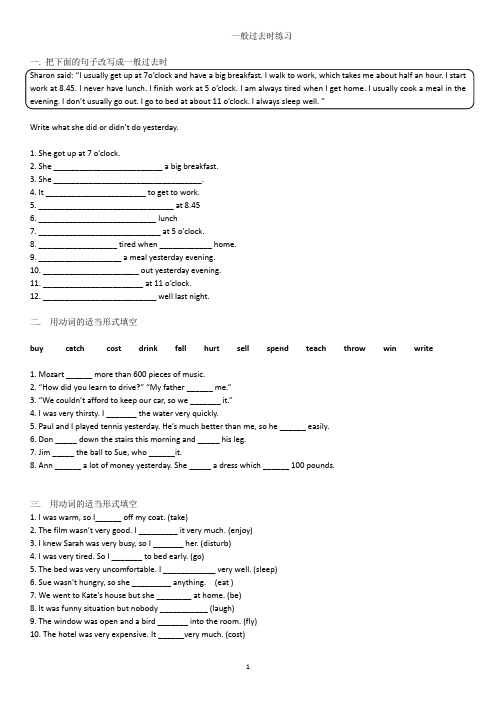
一般过去时练习一. 把下面的句子改写成一般过去时Sharon said: “I usually get up at 7o’clock and have a big breakfast. I walk to work, which takes me about half an hour. I start work at 8.45. I never have lunch. I finish work at 5 o’clock. I am always tired when I get home. I usually cook a meal in the evening. I don’t usually go out. I go to bed at about 11 o’clock. I always sleep well. ”Write what she did or didn’t do yesterday.1. She got up at 7 o’clock.2. She _________________________ a big breakfast.3. She __________________________________.4. It _______________________ to get to work.5. _______________________________ at 8.456. ___________________________ lunch7. ____________________________ at 5 o’clock.8. __________________ tired when ____________ home.9. ___________________ a meal yesterday evening.10. ______________________ out yesterday evening.11. _______________________ at 11 o’clock.12. __________________________ well last night.二. 用动词的适当形式填空buy catch cost drink fall hurt sell spend teach throw win write1. Mozart ______ more than 600 pieces of music.2. “How did you learn to drive?”“My father ______ me.”3. “We couldn’t afford to keep our car, so we _______ it.”4. I was very thirsty. I _______ the water very quickly.5. Paul and I played tennis yesterday. He’s much better than me, so he ______ easily.6. Don _____ down the stairs this morning and _____ his leg.7. Jim _____ the ball to Sue, who ______it.8. Ann ______ a lot of money yesterday. She _____ a dress which ______ 100 pounds.三. 用动词的适当形式填空1. I was warm, so I______ off my coat. (take)2. The film was n’t very good. I _________ it very much. (enjoy)3. I knew Sarah was very busy, so I _______ her. (disturb)4. I was very tired. So I _______ to bed early. (go)5. The bed was very uncomfortable. I ____________ very well. (sleep)6. Sue wasn’t hungry, so she _________ anything. (eat )7. We went to Kate’s house but she ________ at home. (be)8. It was funny situation but nobody ___________ (laugh)9. The window was open and a bird _______ into the room. (fly)10. The hotel was very expensive. It ______very much. (cost)四. 你刚度假回来,别人问了很多关于你的假期的问题。
一般过去时知识点

一般过去时一、基础知识点1.定义:表示过去发生的某个动作或状态2.构成:主语+ 动词的一般过去式+ 其他3.标志词:yesterday 昨天yesterday+时间last+时间ago 之前before 在….之前the day before yesterday 前天just now 刚才4.动词的一般过去时变化规律:⑴一般情况直接在词尾加+ ed,如:cook-cooked wash-washed⑵以不发音的e 结尾的动词,在词尾+ d 如:like-liked live-lived⑶以重读闭音节结尾的动词,双写最后一个字母再在词尾+ed 如:stop-stopped shop-shopped plan-planned 计划⑷以辅音字母+y 结尾的动词,要改y 为i 再加ed 如:study-studied carry- carried 运送,搬运另外须记不规则动词的一般过去时变形。
一般过去时的做题步骤:⑴先找到句子中表示一般过去时的标志词⑵确定句子的动词是用be动词还是行为动词Be动词的过去时练习一、用be动词的适当形式填空1.I _______ at school just now.2.He ________ in Beijing on vacation last week.3.We ________ students two years ago.4.They ________ on the farm a moment ago.5.Yang Ling ________ eleven years old last year.6.There ________ an apple on the plate yesterday.7.There ________ some milk in the fridge on Sunday.二、用行为动词的适当形式填空1. He _________ (live) in Wuxi two years ago.2. The cat ________ (eat) a bird last night.3. We _______ (have) a party last Halloween.4. Nancy ________ (pick) up oranges on the farm last week.5. I ________ (make) a model ship with Mike yesterday.6. They ________ (play) chess in the classroom last PE lesson.7. My mother _______ (cook) a nice food last Spring Festival.二、基本句型转换1.一般过去时的否定句构成:有be 动词和没有be 动词两种情况⑴如果有be动词,要先找到be 动词,再在be动词后加not即主语+ be + not + 其他举例:She was very happy.分析:She 为句子主语,was 为be 动词,故She was not very happy. was not= wasn’t⑵如果没有be 动词,我们就要借用助动词didn’t, 并放在动词前面。
四个基本时态+句型转换练习
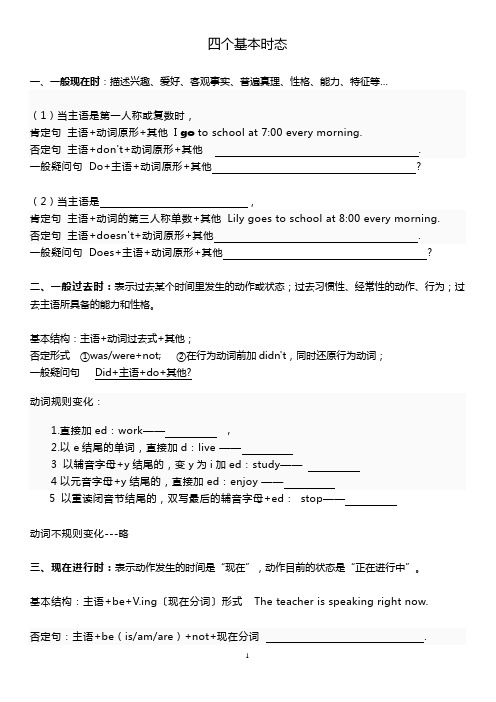
四个基本时态一、一般现在时:描述兴趣、爱好、客观事实、普遍真理、性格、能力、特征等…(1)当主语是第一人称或复数时,肯定句主语+动词原形+其他I go to school at 7:00 every morning.否定句主语+don't+动词原形+其他.一般疑问句Do+主语+动词原形+其他?其他?二、一般过去时:表示过去某个时间里发生的动作或状态;过去习惯性、经常性的动作、行为;过去主语所具备的能力和性格。
基本结构:主语+动词过去式+其他;否定形式①was/were+not; ②在行为动词前加didn't,同时还原行为动词;一般疑问句Did+主语+do+其他?5 以重读闭音节结尾的,双写最后的辅音字母+ed:stop——动词不规则变化---略三、现在进行时:表示动作发生的时间是“现在”,动作目前的状态是“正在进行中”。
基本结构:主语+be+V.ing〔现在分词〕形式The teacher is speaking right now.+Sth? .四、一般将来时:表示将来某一时刻的动作或状态,或将来某一段时间内经常的动作或状态。
常常和表示将来的时间状语连用。
如:tomorrow(明天),next week(下周),from now on(从现在开始);in the future(将来)等。
(1)“will+动词原形”表示将来发生的事情,用于征求对方的意见或表示客气的邀请。
We will go to Disneyland next month.(2).“be going to+动词原形”表示即将发生的或最近打算进行的事。
例如We're going to meet outside the school gate. 我们打算在校门口见面。
Look! . 瞧!快下雨了。
(3)be about to 表示即将发生的动作,意为:很快,马上。
They leave. (=They're going to leave.) 他们就要走了。
一般过去时的用法及结构

一般过去时的用法及结构1.一般过去时的基本用法一般过去时表示过去某个时间发生的动作或存在的状态,也可表示过去经常或反复发生的动作。
常和表示过去的时间状语连用,如yesterday, last week, last night, in 2003, two days ago 等。
【举例】I got up at 6:30 yesterday. 我昨天6:30起床。
My father was very busy last week. 我父亲上周很忙。
2.一般过去时的基本结构⑴ 肯定句“主语+动词过去式+其他”或者“主语+wa s/were +其他”。
【举例】I played tennis last weekend. 我上周末打网球了。
My school trip was great. 我的学校郊游棒极了。
⑵ 否定句“主语+didn’t+动词原形+其他”或“主语+wasn’t / were n’t+其他”。
【举例】The girl didn’t play computer games yesterday afternoon.这个女孩昨天下午没玩电子游戏。
Old Henry wasn’t happy last Friday. 上星期五老亨利不高兴。
⑶一般疑问句“Did+主语+动词原形+其他?”肯定回答为“Yes,主语+did”,否定回答为公。
,主语+didn’t”或者“Was/Were +主语+其他?”肯定回答为“Yes,主语+wa s /were”,否定回答为“No,主语+wasn’t/were n’t”。
【举例】一Did you go to the beach? 你们去海滩了吗?—Yes, we did./ No, we did n’t. 是的,我们去了。
/不,我们没有。
—Was your weekend OK? 你的周末过得还行吧?—Yes, it was. / No, it wasn’t. 是的,还行。
小学一般过去式句型转换
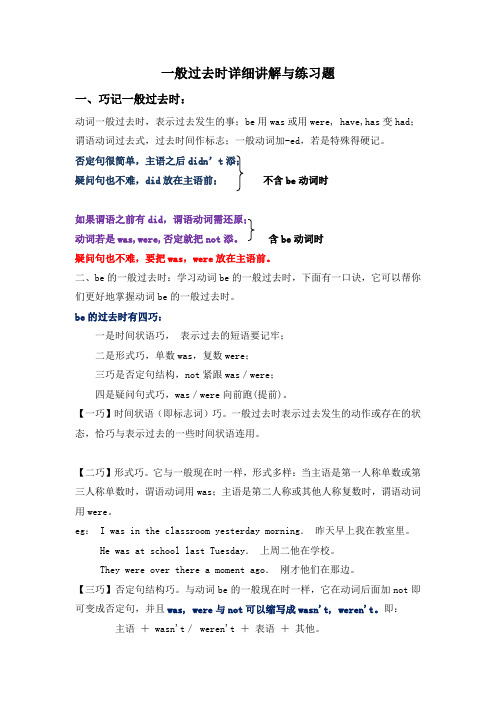
一般过去时详细讲解与练习题一、巧记一般过去时:动词一般过去时,表示过去发生的事;be用was或用were, have,has变had;谓语动词过去式,过去时间作标志;一般动词加-ed,若是特殊得硬记。
否定句很简单,主语之后didn’t添;疑问句也不难,did放在主语前;不含be动词时如果谓语之前有did,谓语动词需还原;动词若是was,were,否定就把not添。
含be动词时疑问句也不难,要把was,were放在主语前。
二、be的一般过去时:学习动词be的一般过去时,下面有一口诀,它可以帮你们更好地掌握动词be的一般过去时。
be的过去时有四巧:一是时间状语巧,表示过去的短语要记牢;二是形式巧,单数was,复数were;三巧是否定句结构,not紧跟was/were;四是疑问句式巧,was/were向前跑(提前)。
【一巧】时间状语(即标志词)巧。
一般过去时表示过去发生的动作或存在的状态,恰巧与表示过去的一些时间状语连用。
【二巧】形式巧。
它与一般现在时一样,形式多样:当主语是第一人称单数或第三人称单数时,谓语动词用was;主语是第二人称或其他人称复数时,谓语动词用were。
eg: I was in the classroom yesterday morning.昨天早上我在教室里。
He was at school last Tuesday.上周二他在学校。
They were over there a moment ago.刚才他们在那边。
【三巧】否定句结构巧。
与动词be的一般现在时一样,它在动词后面加not即可变成否定句,并且was, were与not可以缩写成wasn't, weren't。
即:主语+ wasn't/ weren't +表语+其他。
例如:I was not (=wasn't) here yesterday.昨天我不在这儿。
My parents were not (=weren't) at home last Sunday.上周日我父母不在家。
一般过去时的知识点归纳
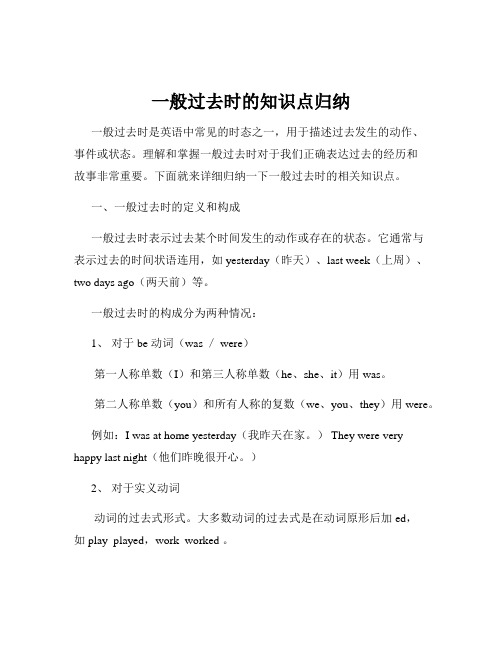
一般过去时的知识点归纳一般过去时是英语中常见的时态之一,用于描述过去发生的动作、事件或状态。
理解和掌握一般过去时对于我们正确表达过去的经历和故事非常重要。
下面就来详细归纳一下一般过去时的相关知识点。
一、一般过去时的定义和构成一般过去时表示过去某个时间发生的动作或存在的状态。
它通常与表示过去的时间状语连用,如 yesterday(昨天)、last week(上周)、two days ago(两天前)等。
一般过去时的构成分为两种情况:1、对于 be 动词(was / were)第一人称单数(I)和第三人称单数(he、she、it)用 was。
第二人称单数(you)和所有人称的复数(we、you、they)用 were。
例如:I was at home yesterday(我昨天在家。
) They were very happy last night(他们昨晚很开心。
)2、对于实义动词动词的过去式形式。
大多数动词的过去式是在动词原形后加 ed,如 play played,work worked 。
但也有一些不规则动词,它们的过去式需要特殊记忆,比如 go went,have had ,do did 等。
例如:He played football last weekend(他上周末踢足球了。
) She had a big party last month(她上个月举办了一个大型聚会。
)二、一般过去时的用法1、表示过去某个特定时间发生的动作或存在的状态。
例如:I met him in the street yesterday(昨天我在街上遇见了他。
)2、表示过去经常或反复发生的动作。
例如:He often went swimming when he was a child(他小时候经常去游泳。
)3、在时间、条件状语从句中,表示过去将来的动作。
例如:She said she would come if she had time(她说如果有时间她会来。
一般过去时的用法及结构
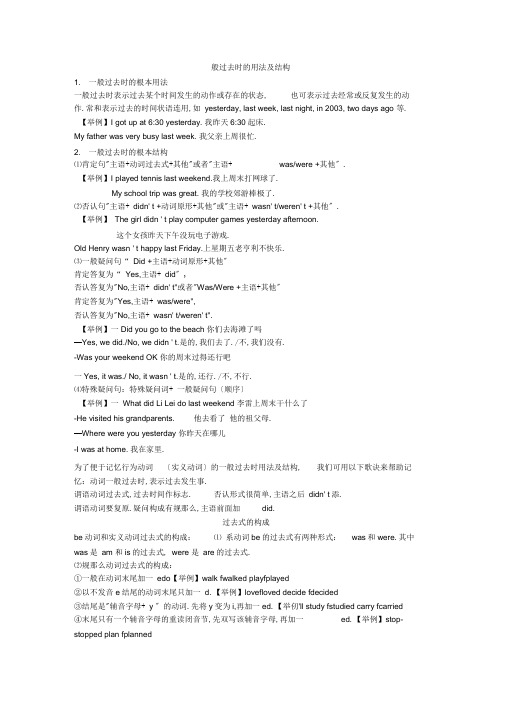
般过去时的用法及结构1. 一般过去时的根本用法一般过去时表示过去某个时间发生的动作或存在的状态, 也可表示过去经常或反复发生的动作.常和表示过去的时间状语连用,如yesterday, last week, last night, in 2003, two days ago 等.【举例】I got up at 6:30 yesterday. 我昨天6:30起床.My father was very busy last week. 我父亲上周很忙.2. 一般过去时的根本结构⑴肯定句"主语+动词过去式+其他"或者"主语+ was/were +其他〞.【举例】I played tennis last weekend.我上周末打网球了.My school trip was great. 我的学校郊游棒极了.⑵否认句"主语+ didn' t +动词原形+其他"或"主语+ wasn' t/weren' t +其他〞.【举例】The girl didn ' t play computer games yesterday afternoon.这个女孩昨天下午没玩电子游戏.Old Henry wasn ' t happy last Friday.上星期五老亨利不快乐.⑶一般疑问句“ Did +主语+动词原形+其他〞肯定答复为“ Yes,主语+ did〞,否认答复为"No,主语+ didn' t"或者"Was/Were +主语+其他〞肯定答复为"Yes,主语+ was/were",否认答复为"No,主语+ wasn' t/weren' t".【举例】一Did you go to the beach 你们去海滩了吗—Yes, we did./No, we didn ' t.是的,我们去了./不,我们没有.-Was your weekend OK 你的周末过得还行吧一Yes, it was./ No, it wasn ' t.是的,还行./不,不行.⑷特殊疑问句:特殊疑问词+ 一般疑问句〔顺序〕【举例】一What did Li Lei do last weekend 李雷上周末干什么了-He visited his grandparents. 他去看了他的祖父母.—Where were you yesterday 你昨天在哪儿-I was at home. 我在家里.为了便于记忆行为动词〔实义动词〕的一般过去时用法及结构, 我们可用以下歌诀来帮助记忆:动词一般过去时,表示过去发生事.谓语动词过去式,过去时间作标志. 否认形式很简单,主语之后didn' t添.谓语动词要复原.疑问构成有规那么,主语前面加did.过去式的构成be动词和实义动词过去式的构成:⑴ 系动词be的过去式有两种形式:was和were.其中was是am 和is的过去式, were 是are的过去式.⑵规那么动词过去式的构成:①一般在动词末尾加一edo【举例】walk fwalked playfplayed②以不发音e结尾的动词末尾只加一d.【举例】lovefloved decide fdecided③结尾是"辅音字母+ y 〞的动词.先将y变为i,再加一ed.【举仞'll study fstudied carry fcarried④末尾只有一个辅音字母的重读闭音节,先双写该辅音字母,再加一ed.【举例】stop-stopped plan fplanned规那么动词的过去式构成方法可用以下口诀来记忆:过去式构成有规律,一般词尾加一ed如果词尾有个e 〔不发音的〕,只需直接加上一d. “辅音字母+ y 〞在词尾,变y为i加一ed.“一辅重闭〞作尾巴,双写之后加一ed.随堂练习:一.写出以下动词的过去式./is _________ ___________ _____________ ____________'t 6. aren' t二.用适当的词完成以下对话.1.— How was your weekend — It great.一What _ you_ last weekend — I _ some homework.to the beach.2. 一What last weekend She3. —What —___ they do last weekend —They ___ ___ to the movies.三.用括号内所给词的适当形式填空.1. We(enjoy) ourselves at the party last night.(study) for the English test last Sunday.you(go) to the Great Wall last year4. What day(be) it yesterdayold man(be)ill and went to see a doctor.(have) a party last night.(visit) the museum and went home.8.— How(be) the students — They were very friendly.often(have) supper at home. Today he(have) supper at school.had great fun(play) in the water.made me(feel) very happy.12.-he(have) lunch at nine — No, he didn ' t.(buy) a guitar yesterday.四.句型转换.1. He came here last month.(改为否认句)He here last month.1.1. hey played football this morning.(改为一般疑问句并作简略答复)一they football this morning —Yes, they./ No, they.3 .They went to Beijing last year.(就划线局部提问)they last year.4 .Tom watched TV last night.(改为一般疑问句)Tom TV last night5 .Mary does homework every day.(用last night 改写句子)Mary.般现在时的用法与结构1、一般现在时的定义及构成一般现在时表示现在经常反复发生的动作、存在的状态或习惯性的动作.〔1〕 be〔am,is,are〕动词:〔作谓语动词时〕肯定句:主语+be动词〔am,is,are〕+其它.如:①I am a student.〔主语+be动词+名词〕②They are hungry.〔主语+be动词+形容词〕③He is out.〔主语+be动词+副词〕④That pen is mine.〔主语+be动词+ 代词〕⑤I am fifteen.〔主语+be动词+数词〕⑥The bike is under the tree.〔主语+be动词+H司短语〕运用am,is,are写三个句子否认句:主语+ be〔am,is,are〕 + not +其它.如:He is not a worker.他不是工人. 运用am,is,are 写三个句子一般疑问句:Be〔am,is,are〕 +主语+其它.如:-Are you a student -Yes. I am. / No, I'm not.运用am,is,are 写三个句子特殊疑问句:疑问词+一般疑问句.如:Where is my bike 运用am,is,are 写三个句子特殊疑问句:疑问词〔what, where, who, when, which, whose, how, how many, how much, what shape,what colour,〕,找句子中有没有be动词〔is, am或者are〕或情态动词或者助动词〔特殊疑问句:疑问词+be动词〔is, am或者are〕或情态动词或者助动词+其他〕〔2〕行为动词:主语+ 行为动词+ 〔其它〕.〔作谓语动词时〕1〕主语不是第三人称单数时,肯定句为:主语+动词原形+其它否认式为:主语+don't+动词原形+其它疑问句为:Do+主语+动词原形+其它. ① We speak Chinese.②Do you speak Chinese ---Yes, I do. / No, I don't.③They don't speak Chinese.写三个句子2〕当主语是第三人称单数时:〔he,she,it,A/An,单独的人或事物:Lily/book〕肯定句为:主语+动词〔词尾加s或es〕 +其它.否认式为:主语+doesn't+动词原形+其它.疑问句式:Does+主语+动词原形+其它①He speaks English.②He doesn't speaks English.③-Does she go to work by bike Yes, she does. / No, she doesn't.写三个句子特殊疑问句:疑问词+一般疑问句.如:How does your father go to work3〕动词+s的变化规那么〔1〕一般情况下,直接加-s,如:cook-cooks, milk-milks〔2〕以s. x. sh. ch. o 结尾,力口-es, 如: guess-guesses, wash-washes, watch-watches, go-goes 〔3〕以"辅音字母+y"结尾,变y为i,再加-es,如:study-studies〔3〕情态动词〔作谓语动词时〕〔can,could,be able to,may,might,must,have to,need,shall,should, will,would〕时,句子结构为:肯定句:主语+情态动词+动词原形.否认句:主语+情态动词+not+动词原形一般疑问句;情态动词+主语+动词原形+其他特殊疑问句:疑问词+情态动词+主语+动词原形+其他Eg:① He can speak English.② Can I help you What can I do for you在实际应用中,一般现在时常与以下时间状语联用:always, usually, often, sometimes, every week (day, year, month …), once a week, on Sundays 例句:He usually plays football on Sundays.一、写出以下动词的第三人称单数talk forget hope stop perform play saybuy worry fly study like make take__love recite become come drive二、句型转换1. The children have a good time in the park.否认句:_______________________________________________一般疑问句:_____________________________________________对划线局部提问:_________________________________________2. There is about nine hundred people at the concert.否认句:_______________________________________________一般疑问句:_____________________________________________对划线局部提问:_________________________________________3. Ann does her homework yesterday evening.否认句:_______________________________________________一般疑问句:_____________________________________________对划线局部提问:_________________________________________4. I read an English book.否认句:______________________________________________一般疑问句:_____________________________________________肯定/否认答复:________________________________________对划线局部提问:_________________________________________5. My brother is in the park just now.否认句:______________________________________________一般疑问句:_____________________________________________对划线局部提问:_________________________________________一般现在时第三人称单数句型转换练习1. I go to school before 7:00 in the morning.(he ) __________________________________________________________2. I always go shopping with my mum on Sunday.( she ) ________________________________________________________2.1 sometimes play computer games after school on Sunday.( he ) _________________________________________________________4. I always take exercise after class on Monday.( my mother ) ________________________________________________________般过去时详细讲解与练习题一、巧记一般过去时:动词一般过去时,表示过去发生的事;be用was或用were, have,has变had;谓语动词过去式,过去时间作标志;一般动词加-ed,假设是特殊得硬记.否认句很简单,主语之后didn' t添;疑问句也不难,did放在主语前;}不含be动词时如果谓语之前有did,谓语动词需复原;动词假设是was,were,否认就把not添. }含be动词时疑问句也不难,要把was, were放在主语前.二、be的一般过去时:学习动词be的一般过去时,下面有一口诀,它可以帮你们更好地掌握动词be的一般过去时.be的过去时有四巧:一是时间状语巧,表示过去的短语要记牢;二是形式巧,单数was,复数were ;三巧是否认句结构, not紧跟was/were ;四是疑问句式巧,was/were向前跑(提前).【一巧】时间状语(即标志词)巧.一般过去时表示过去发生的动作或存在的状态,恰巧与表示过去的一些时间状语连用.1 . yesterday 或以其构成的短语:yesterday morning(afternoon, evening) 等;2 .由“last+-时间名词〞构成的短语:last night, last year (winter, month, week)等;3 .由“时间段+ago〞构成的短语: a moment ago, a short time ago, an hour ago 等;4 .其它:just now 等5 .由某些表示过去时态的从句等.【二巧】形式巧.它与一般现在时一样,形式多样:当主语是第一人称单数或第三人称单数时,谓语动词用was;主语是第二人称或其他人称复数时,谓语动词用were.例如:I was in the classroom yesterday morning . 昨天早上我在教室里.He was at school last Tuesday. 上周二他在学校.They were over there a moment ago . 刚刚他们在刃B边.【三巧】否认句结构巧.与动词be的一般现在时一样, 它在动词后面加not即可变成否认句,并且was, were与not可以缩写成wasn't, weren't o即:主语 + wasn't/ weren't + 表语 +其他.例如:I was not (= wasn't) here yesterday . 昨天我不在这儿.My parents were not ( = weren't) at home last Sunday . 上周日我父母不在家.【四巧】疑问句式巧.把was, were 提到句首,句末用问号即可变为一般疑问句. 即: Was(Were) +主语+表语+其他这恰巧与动词be 的一般现在时的疑问句式相似.例如: Were you at home the day before yesterday ? 前天你在家吗Was she late this morning?今天早上她迟到了吗更巧的是疑问句的答语也相似,肯定答复用“ Yes,主语+ was/were . 否认答复用“No,主语+ wasn't/weren't .".例如:一Were Wei Hua and Han Mei here just now ?刚刚魏华和韩梅在这儿吗— Yes, they were. (No, they weren't .)是的,她们在.(不,她们不在.)一、单项选择: 从以下各题后所给的四个选项中选择最正确答案填空. (10)( )1. My father ill yesterday . A isn't B. aren't C. wasn't D. weren't ()2. your parents at home last week ?A IsB WasC AreD Were()3. The twins in Dalian last year.They here now .A are; wereB . were; areC was; areD were; was ()4. your father at work the day yesterday (前天)? A. Was; before B. Is; beforeC. Was; afterD. Is; after()5. —Who was on duty last Friday ?A I amB I wasC Yes, I wasD No, I wasn't ()6. I cleaned my classroom.A with three hoursB three hours agoC in three hoursD three hours before ( )7. I came my house two days ago .A back onB back toC to backD back () 8 . He did some reading at home.A What does your father do yesterday eveningB What does your brother do in the schoolC What did your brother do over the weekendD Where did your brother go last Sunday ()9. What did you do I went to the movies.A next morning Bover the weekend C in the weekend D next Monday ()10. The koala sleeps, but gets up. A during the day; at the eveningB at day during nightC in the day during the eveningD during the day ; at night二、请用正确动词形式填空.(10)1. I ______2.__ (have) an exciting party last weekend. _ she _______ (practice) her guitar yesterday No, she ___________ 3. What____ T om _______ (do) on Saturday eveningHe ______ _(watch) TV and _________ (read) an interesting book. 4. They all________ (go) to the mountains yesterday morning.5.She ____ ____ (not visit) her aunt last weekend.She _____ ___ (stay) at home and _______ (do) some cleaning.6. When __ ____ you ________ (write) this song I _________ (write) it last year.7 .My friend, Carol,〔study〕 for the math test and〔practice〕 English last night.8 .Mr. Li〔do〕 the project on Monday morning Yes, he.9 . How〔be〕 Jim's weekend It〔be not〕 bad.10 .〔be〕 your mother a sales assistant last year No. she.三、译以下句子〔20〕1 .我过了一个忙碌但却刺激的周末.I ______________________________________ exciting weekend.2 . Jenny喜欢看书.昨晚她看了一本英语书.Jenny likes. She an English book last night.3 . Emma每天都看电视.可是昨天他没有看.Emma TV every day. But he yesterday.4 .上周六他们做什么了他们做作业和购物了.What they SaturdayThey homework and.5 .今天早上方方得做饭,由于他父亲不在家.This morning Fangfang ________________ because his father yesterday.6 .你还有什么要说的What would you like7 .放学另U忘了向老说声再见. Don, t forget ____________________________ the teacher.8 .为什么你昨晚没有看电视Why you TV last night9 .他在清扫教室的时候,发现地上有块表.When he the classroom, he a watch on the ground.10 .他什么时候出生的1980年.--When he---1980.四、改写句子:〔20〕1、Lucy did her homework at home.〔改否认句〕Lucy her homework at home.2、He found some meat in the fridge 〔冰箱〕.〔变一般疑问句〕 he meat in the fridge3、There was some orange in the cup.〔变一般疑问句〕 there orange in the cup4. Frank read an interesting book about history. 〔一般疑问句〕Frank an interesting book about history5. Why not go out for a walk 〔同义句〕out for a walk6. Thomas spent RMB 10 on this book.〔否认句〕Thomas RMB 10 on this book.7. My family went to the beach last week.〔划线提问〕family last week8. I think she is Lily' s sister.〔否认句.注意否认转移〕9. Sally often does some reading in the morning. 〔否认句〕Sally often some reading in the morning.10. He is a tall, thin boy.〔划线提问〕_ he五、改错题(20)1. How is Jane yesterday2. He go to school by bus last week.3. He often goes home at 6:00 last month.4. I can fly kites seven years ago. _____________________________5. Did you saw him just now. ___________________________________6. Tom wasn' t watch TV last night. _____________________________________7. I didn ' t my homework yesterday. ____________________________________8. He wait for you three hours ago. ___________________________________9. Who find it just now ________________________________________make him cry (哭)just now __________________________________六、完形填空(10)Tom did not like doing his homework , because he liked to do some 1 things after school . And his teacher always 2 a lotof mistakes in his homework .Then one day, his maths teacher 3 at Tom' s homework and saw that he got all hisanswers right . He was very 4 and surprised (惊奇).The next morning before class ,he called Tom 5 his desk and 6 to him , “You got all your homework right thistime . Did your father help you " Sometimes Tom' s father helped him with his homework , 7 this time he didn ' t help Tom because he 8 at home . So Tom answered, " NO,Sir. He Was busy last night, so I 9 to do it 1010. . A. others B. another C . the other D. other11. . A. made B. found C. looked at D. looked12. . A. laughed B. knocked C. looked D. saw13. . A. please B. pleased C. pleasure D. sad14. . A. to B. forC. inD. at15. . A. talked B. asked C. spoke D. said16. . A. and B. but C. so D. or17. . A. isn' t B. won' tbeC. wasn' t D. can' t be18. . A. wanted B . mustn ' t C. liked D. had19. 0. A. itself B . of them C . myself D. himself七.写作(10).日记一那么,字数50---60.记叙一天的活动:1 .早晨起床,吃饭,上学;2 .上午的课程,并就其中一堂课进行描述; 3.午休的活动;4.下午的课程及作业;5.晚上的安排.答案:一、单项选择:1---5 CDBAB 6----10 BBCBD二、 2. Did; practice; didn't ; do; watched; read5.didn't visit; stayed; did write; wrote ; practiced8. Did; do;did ; wasn't 10. Was; wasn't三、 a busy but books; read; didn't watch TV ; do last; did their; went shoppingto cook breakfast; wasn't at home ; to say; say goodbye to ; watch ; found ; born; In四、't do 2. Did; find any 3. Was; any4. Did; read5. Why don't you go 't spend did your; go 8. I don't think she is Lily's sister 't; do. 10. What does; look like五、't didn't7.在didn't 后力口do六、1----5 DBCBA 6——10 DBCDC七、写作〔略〕。
- 1、下载文档前请自行甄别文档内容的完整性,平台不提供额外的编辑、内容补充、找答案等附加服务。
- 2、"仅部分预览"的文档,不可在线预览部分如存在完整性等问题,可反馈申请退款(可完整预览的文档不适用该条件!)。
- 3、如文档侵犯您的权益,请联系客服反馈,我们会尽快为您处理(人工客服工作时间:9:00-18:30)。
句型转换
例句:Mr. Green cooked a lot of food on Wednesday.
Mr. Green didn 'cook a lot of food on Wednesday. (改成否定句)
Did Mr. Green cook a lot of food on Wed nesday? (改成一般疑问句)
Yes,he did .(肯定回答)No,he didn ' (否定回答)
What did Mr. Green do on Wednesday?(对划线部分提问)
1. The children played games in the park.
①②
否定句:__________________________________________________
一般疑问句:________________________________________________
肯定回答:______________________ 否定回答: __________________
对划线部分提问:①___________________________________________
②_______________________________________________
2. Ann did her homework yesterday evening.
①②
否定句:__________________________________________________
一般疑问句:________________________________________________
肯定回答:______________________ 否定回答: __________________
对划线部分提问:①___________________________________________
②__________________________________________________
3. I read an English book last week.
否定句:__________________________________________________
一般疑问句:________________________________________________
肯定回答:_____________________ 否定回答:___________________
对划线部分提问:____________________________________________
3. She had some bread for lunch today.
①②
否定句:__________________________________________________
一般疑问句:________________________________________________
肯定回答:_____________________ 否定回答:___________________
对划线部分提问:①____________________________________________
②________________________________________________
5.Su Yang visited a farm two days ago.
否定句:__________________________________________________
一般疑问句:________________________________________________
肯定回答:_____________________ 否定回答:___________________
对划线部分提问:____________________________________________
Welcome To Download !!!
欢迎您的下载,资料仅供参考!。
